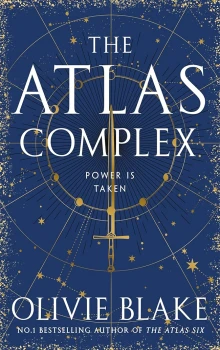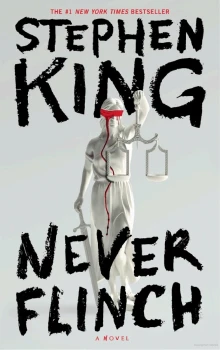THE EZRA SIX
SIX
Nothazai
Edwin Sanjrani was a miracle even before he was born. His parents (a diplomat and a former opera singer turned society wife) were getting on in age, and his mother had already had several miscarriages and stillbirths for which many uncomfortable procedures had had to be undergone. Eventually, Katya Kosarek-Sanjrani was diagnosed with cancer of the thyroid, at which point the Sanjranis were advised to stop. Stop attempting to procreate. Stop traveling so much. Stop living so freely and instead stay home, or at the very least stay in range of a hospital. Stop tasting food, stop growing hair, stop seeing yourself as capable or even moderately able.
But then, of course, as life occasionally has it, the seed that would be Edwin Sanjrani was already planted, and it was too late for either Katya or her husband Edwin Senior to halt the irreversible throes of fate.
Pregnancy was a strange thing. Childbirth in general. The process of a body becoming host to a slightly parasitic creature (a blessing!) meant that all functions of said body would cease to go on as they had once done. The birthing body becomes a martyr, or alternatively, a full-service studio apartment. Hormones shift. Priorities shift. Brain cell production in the mother slows to accommodate the body’s new love: the growing cluster of cells that will eventually become a baby. Sometimes, of course, the birthing body decides the code is incomplete, the cluster of cells is nonviable, dragging production to a halt so that the factory may begin again, to try another time but better. In other cases, the birthing body takes a look at the malignant growth beginning to stain the factory walls and says hm, you know what? We should really get that under control, it’s bad for the beloved cell-cluster.
Outside the workings of the mother-machine, Katya’s cancer cells stopped multiplying. The tumor was removed and oddly, only the good cells remained. By the time the cells that would become Edwin Sanjrani and the various parts of the would-be Edwin Sanjrani equation (right-handedness, a taste for spice, dislike of the color orange, a slightly morbid sense of humor, and a tendency to over-explain) were already viewed by his mother and father as a reason to cast aside their directive to stop in favor of simply more going. Katya’s burgeoning cancer was cured and did not return, and so the Sanjrani family continued their diplomatic roles until Edwin was born in New Zealand as a citizen of the United Kingdom, already beloved. Already doomed to fail up.
Which was not how Edwin saw it, of course. His last name wasn’t Astley or Courtenay and his tenure at various international boarding schools was therefore not without its discomforts. It was also hard work being a miracle, because he wasn’t simply Katya’s miracle. He was born knowing how to look at a body and see its little failures, the various glitches in the factory walls. Knowing the problem wasn’t the same thing as knowing the solution, but sometimes the two went hand in hand. Sometimes Edwin could see a tumor, diagnosing a headache as something worse just in time to disarm a bomb. Sometimes he could see a clot that could become an implosion or fragment of cellular shrapnel that would otherwise need removing. He could see infection, and therefore the possibility that something may soon go very wrong.
Having the answer often implied a sense of responsibility for the question, and this was burdensome, as all callings are. When Edwin was sixteen, it became his job to make his father more comfortable. When he was twenty-four, it was his mother’s turn. Despite relatively early deaths, it wasn’t difficult for either of the Sanjranis to believe they had fulfilled their calling on earth, because how can one be disappointed in oneself when one has created a miracle? Edwin would survive them, and Edwin would do good. This was the meaning of a legacy. This was how the body lived on.
Edwin was very obviously a medeian and he chose his father’s alma mater, the London School of Magic, which had become a leading university as the world gave way to the rise of magical technologies—to a world where magic could be the solution to all of its problems, even the ones magic itself had caused. In his early days at university Edwin had trained as a diagnostic biomancer, hoping to become a practitioner, which was admittedly less flattering than other things he could have been. It was a bit like wanting to be a lawyer when one was already a duke—what would be the point? But Edwin was very serious about helping humanity, about the goodness therein. He sat at bedsides, held clasped hands. Like the miracle he’d been since birth, Edwin poured himself into the work.
Which was how Edwin became acquainted with an illness he realized he could not stop. He didn’t know what to call it. Misinformation? Some toxic form of hate? Diseases without a name were difficult to diagnose—it was more a matter of knowing it when he saw it. Over time, it would manifest in several different ways. Anti-vaccination movements. Religious zealotry that meant some people staunchly went untreated. Bigotry that meant some people went untreated specifically by him. Edwin was already well into his studies by the time he learned of advancing biomancy techniques that meant altering a patient’s genetic code, which was very like what Edwin could do, except it defused the bomb even before Edwin could see it. It defused even the possibility of a bomb. Obviously, there were improper uses—or less proper uses, anyway, wherein a medeian with sufficient means could remove a pollen sensitivity or request that his offspring not be so picky with food textures or be able to concentrate at all times.
It was slightly like guessery, statistically projecting the possibility that a thing might go wrong, and therefore yes, perhaps there were misuses on the horizon—Edwin’s work was expensive, his patients the most privileged and most entitled, too, so that was one contributing factor to the question of ethics, which was fair enough on its own. But the conversation grew weighted against Edwin and toward some absurd state of nature; some belief in what was “natural” that began with the wealthy hypocritical and trickled down to the easily manipulated, who were coincidentally the most in need. An existential paradox, clinging to the belief that humans were good when humanity as a collective was rubbish. The more that biomancy advanced, the more people at large seemed to see Edwin Sanjrani as a devil or a terrorist. (Unclear how related this was to his identity or to his craft. It was inseverable nonetheless.)
This was all extracurricular, of course. Curricularly Edwin was a rising star, and co-curricularly he was popular among his classmates because he was—despite other little eccentricities like his name or his face—rich and sanguine and well-traveled enough to be acceptably posh. (He was posh, actually, but saying so defeated the purpose.) He was among the rare few to be invited to one of the London School’s secret societies, the Bishops, which was where he learned of the existence of a more pressing secret: the Alexandrians. Little more than a rumor, of course, that particular Society, but Edwin had lived a comfortable enough life to know that rumors for some were usually true and accessible for others.
He did not get recruited. He passed into his thirties and the window of possibility came and went. Was it again because of his face, his name? Possibly. By then his view of humanity had grown irreversibly dim. He was starting to see less and less of it to save.
But righteous anger has a way of motivating even the most frustrated of chaps, and when the Forum came calling for a diagnostic biomancer as an expert witness in one of their Causes (the man called Nothazai would unironically use that word later in life, though at the time, Edwin could only think it with a bit of an eye roll as an asterisk) he began to see the possibilities of dismantling the system that had built him his personal ceiling; the invisible structure that only the Alexandrian Society and a handful of his aristocratic classmates could properly see. Edwin was born in a comfortable home but not the peerage. He came with a classical education and a keen eye for observation but did not intrinsically know what was or wasn’t uncouth. He’d seen too much of the world before the age of five to really think it was that small—it did not begin and end with a tiny island off the coast of mainland Europe, for example—but something so conquerable should not have been such a puzzle. The problem with the world remained, for Edwin, completely elusive, its symptoms too frustratingly indecipherable to diagnose.
Eventually Edwin stopped going by Edwin. The name was too commonplace, made him feel like he was playing pretend, and he did not aspire to be common. He shrugged on Nothazai like a cloak, letting it secure him an aura of mystery, a sense that maybe he was something more than a normal human man and therefore pushing him closer to the miracle he’d been at birth. He learned of a man named Atlas Blakely, obviously weaned on a silver spoon, and the more Nothazai’s heartsickness twisted—the more cases of inequity he could not solve, the more aristocratic priggery he could not unravel, the more people spoke about “their” country as if it had never been his—as if he had not been born in service to the very country “they” had done little to nothing for, coughing up phlegm from the compromised lungs he had so long tasked himself with saving—the more Nothazai buried himself in righteousness; in self-righteousness. In the knowledge that where others had failed, he would not. Where others were failing were merely others’ failures. He, Nothazai, had an eye for corruption, and like he had once done for the body in which his cluster of potential greatness had been compiled, he, Nothazai, would be the one to suck the poison out.
In practical terms, of course, the day to day was deeply uninteresting. Legal briefs were filed. As were pages and pages of press briefings, his moniker scripted daily by the hundreds on official Forum statements, on critical website redesigns. Symposiums were given on diversity in the workplace. Staying at the forefront of evolutions in technomancy meant a lot of dull articles he read while falling asleep at his desk. Algorithms, free and transparent government, labor organizations, evidence to be presented in court. Sir, where would you like this pile awaiting your signature? Sir, Carla’s on maternity leave, she’s birthing some other cluster of future miracle that will surely overtake you at this glacial and thankless pace.
Nothazai had been glad, really, when Ezra Fowler dug up the thing he’d done to take part in the Bishops, the tiny bit of hazing that had gone horribly awry. (He’d known Spencer had a weak heart but how was he supposed to know how much heroin it could handle? He’d been sloshed out of his bleeding mind.) Everyone made mistakes and it wasn’t like the world had lost much, just another son of a so-and-so who was a cousin of someone’s Grace or Highness or some other somesuch, and anyway, Nothazai had already made his peace with it by then. He’d saved countless lives, won countless advancements in biomancer technology, and it had never been his fault to begin with—after all, Spencer’s decisions weren’t his.
But the library was real, and that was important. The Alexandrians were out there, and Ezra Fowler had handed it to him, the key to his personal echo chamber. To the knowledge Nothazai had always possessed, that he could and would remake the world—not the world that Ezra was so intent on saving, because who knew what the distant future even meant—but the world that Nothazai himself had lived in, which had been dying slowly from the start.
Who knew where the problems actually began? Institutional religion? Imperialism? The invention of the printing press or the steam engine, or was it irrigation? Why bother going that far back. The point was the library, the resources within it, which Nothazai was meant to access and to harness. He was born for this, to save humanity, and if he ever got access to the archives, he would be the savior to finally give that knowledge back.
Or.
(“Not him,” came a snarling woman’s voice. “Isn’t there someone else?”)
Or.
(“We have to take our country back!”)
Or maybe it wasn’t worth it, actually, putting that kind of information into the hands of capitalists like James Wessex, who had used his confirmation of the library’s archives to go ahead and build some consciousness-exploding guns. It certainly did not belong in the hands of the United States government or the Chinese secret service—as if either country needed the go-ahead on further sullying the oceans and eventually destroying the sun. It belonged with the academics, of which his old friend Dr. Araña was one, but she had gone completely unhinged in recent months, and while Nothazai couldn’t argue that her methodology was effective, there were certain rules about which despotic leaders you could or couldn’t depose. (Again, look at the United States. Just because some things were objectively a nightmare didn’t mean you were allowed to interfere.)
Nothazai understood implicitly that some people could not be saved. Some people could witness a miracle firsthand and still complain that its skin was too brown. That was the way of the world, had always been, and when he got the offer to take up the helm of the Society, he had already known the presence of opportunity. While standing in the ornate manor house, he had known it, the truth about what could be done. Written in the pulse of his chest was the knowledge that he could finally do it—he could end the secrecy, the tyranny of the chosen few, the oligarchy of academia and wealth that could change the trajectory of the world, rewrite it. He could force the Alexandrians into the light, revealing their ugly secrets, their institutional flaws. Their inherited ones. Both the real and proverbial weak chins.
But desire left him slowly, drained from him bit by bit, like the fading vestiges of light from the snakelike windows, the high slits along the hallowed halls of the sacred house. Nothazai walked by the portraits, the Victorian busts, the Neoclassical columns, and all of it faded into the cracks of a tired heart, the shadows of Nothazai’s exhaustion. He knew it, deeply, like the cancer he knew he’d inherited. The ending that would find him one day. The future he could already foretell.
Humanity did not want to change. It did not deserve it.
He swallowed it down, knowing it was a door he couldn’t turn back from. A truth he could never unsee.
In the moment that Nothazai turned his back on a miracle, he pushed open the doors to the reading room and found it already occupied. A young woman stood there, maybe mid-twenties, brown hair tied back in a ponytail, a simple skirt paired with unremarkable shoes. She had flat feet, something of a spine alignment problem. Nothazai didn’t see doom written on her anywhere specific, but that didn’t mean it wasn’t there. Posture was very important.
“Oh,” she said, a little startled. “Hi. Are you—?”
“The new Caretaker,” Nothazai supplied for her, extending a hand politely. American accent. Ah yes, this was Elizabeth Rhodes, one of Atlas Blakely’s pet physicists. He’d read her file. Very impressive, though she was exactly the problem, in Nothazai’s view. All that power. All the people she could save. And instead she’d created a weapon, an unprecedented perfect fusion reaction, only to set off a fucking bomb. He could try her for treason if he were still at the head of the Forum, though it would only be a symbolic international court for violations of human rights and therefore condemnation would be more of a disapproval thing. A wag of a finger. Not cool.
In any case, he was not the Forum any longer. Good. He was sick of people, their lack of gratitude. Sick of people criticizing any good he tried to do. Maybe Elizabeth Rhodes was right to set it all ablaze and her only mistake had been in leaving everything mostly intact.
She shook his hand warily. “Are you the new researcher?” Nothazai asked her, because he had been told he would receive one, which was good. He did not plan to carry out his tenure attending to further tedium. Not when there was an ancient, all-knowing set of archives to explore.
“I—” She bit her lip, which struck him as an irritating tic. He hoped she did not do it often. He didn’t hear the entirety of her answer, as he had not come here for small talk or the blustering of a girl half his age. She said something about waiting for a book, which, wonderful. He would set stricter parameters on who could use the archives later in the day.
Nothazai faced the pneumatic tubes with a thrill of anticipation. He had made a list, a long one, which he’d painstakingly narrowed down to a few select titles, some of which were lost to antiquity and some that were curiosities of his—Arabic medicinal texts that would supplement his theories. Hippocrates. Galen. Bogar. Shennong. Ibn Sina. Al-Zahrawi. Nothazai didn’t do much biomancy these days; as a habit he routinely chose not to, because the results were always irritating. Lawsuits, several times. An almost unavoidable series of complaints, criticism that although lives had been saved and wounds had been healed, he hadn’t done it quite perfectly enough. Nothing had dimmed Nothazai’s opinion of mankind like healing the sick, and while he’d had to do it recently—as part of the deal that got him here, with the telepath who would likely need a mastectomy before her fortieth birthday, which would no doubt be a wound to her vanity but would save her life, a decision Nothazai did not care to take part in—he knew that good deeds never went unpunished. The young girl he’d saved, the cancer he’d removed for her, she’d be back for more someday. Maladies were endless. Life was hard. Someday she’d want his help again and he’d say no and she’d call him selfish, but what was life without a little selfishness? The only diagnosis for life was death—unless this library suggested otherwise, of course. In which case Nothazai wasn’t going to waste what little time he’d ultimately have.
The tube system was simple enough. He and Elizabeth Rhodes stood beside each other in awkward but untroubled silence. There was something else in there, he realized. Some other genetic malady, some degenerative quality, unknown as yet whether it would affect her or merely her progeny over time. No use sharing that kind of information. What do you tell someone carrying around a little death? People were all vehicles for mortality, some more recklessly than others. As a matter of self-preservation, it was abjectly impractical to try.
As for Nothazai, he had gotten exactly what he wanted. The Alexandrian Society was now in his care. Perhaps he would leak some of his findings—the less critical ones, the consumable ones that humanity might like. Pictures of the hanging gardens of Babylon for someone to later claim were faked. The beauty secrets of Cleopatra, which would immediately be condemned for their crimes against feminism. Ha, Nothazai thought grimly. This was the real problem with the world. People looked at a miracle and thought wow, if only it were something else.
The man called Nothazai was right about this, of course.
Critically, though, he was also very wrong.
_______
What Nothazai could not know in the moment that he and Libby Rhodes both received their respective responses from the archives was that she knew precisely who he was, and was currently battering herself with that knowledge. She had recently been a person who took it upon herself to fix the world’s ills and yet there it was, another problem. Another set of unclean hands.
Libby Rhodes would, of course, not know that when Nothazai parted with Parisa Kamali, the telepath had already understood something important about the archives that she had not shared with anyone else, least of all him. (Parisa Kamali was not an honest person. Generally, it did not behoove her to tell the truth.)
Libby couldn’t help a sidelong glance at Nothazai beside her. Specifically, at what the archives had bequeathed at his request. At the moment that Libby considered herself to be surreptitious, Nothazai would detect what he believed to be a glint of sardonic laughter in her eye, though perhaps it was merely the low light. In lieu of continuing the conversation, he would stride quickly out of the reading room, not pausing until he stood in the corridor, the paper unfurling in his hand with the softness of a petal, and Edwin Sanjrani, born a miracle, would take it like a stab of irony—the damning slam of a cosmic gavel.
Libby Rhodes knew the feeling well, because she had received the same message before. Several times, in fact. REQUEST DENIED. She would see the little slip of paper in his hands and recognize the prison Nothazai had built for himself; the same one Libby had willingly entered, and the one that had been Atlas Blakely’s inescapable end. The library had a sense of humor, which Libby Rhodes knew for certain—for wretched, absolute fact.
Because this time, unlike all the other times, the archives would finally grant her wish.
Could I have saved my sister?
(How many people had she betrayed in search of an answer?)
Here, offered the archives in something of a hissing whisper, temptation coiling tighter.
Open the book and find out.





